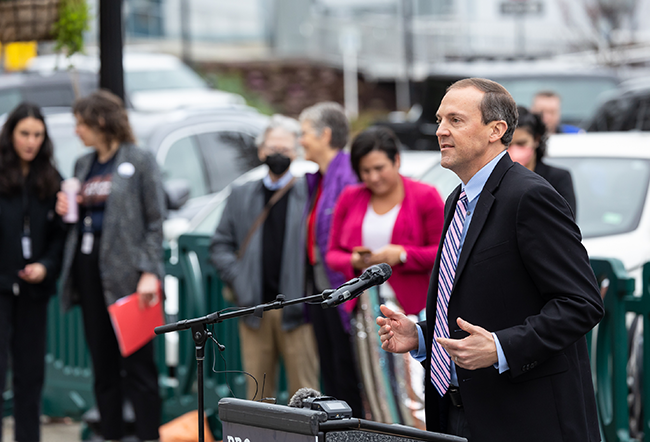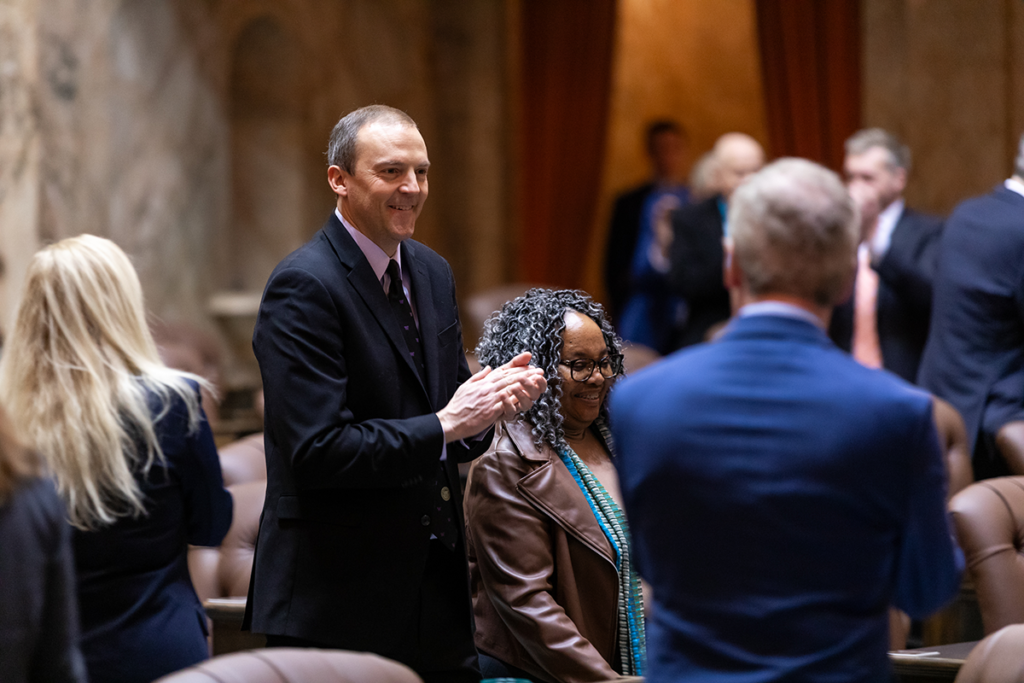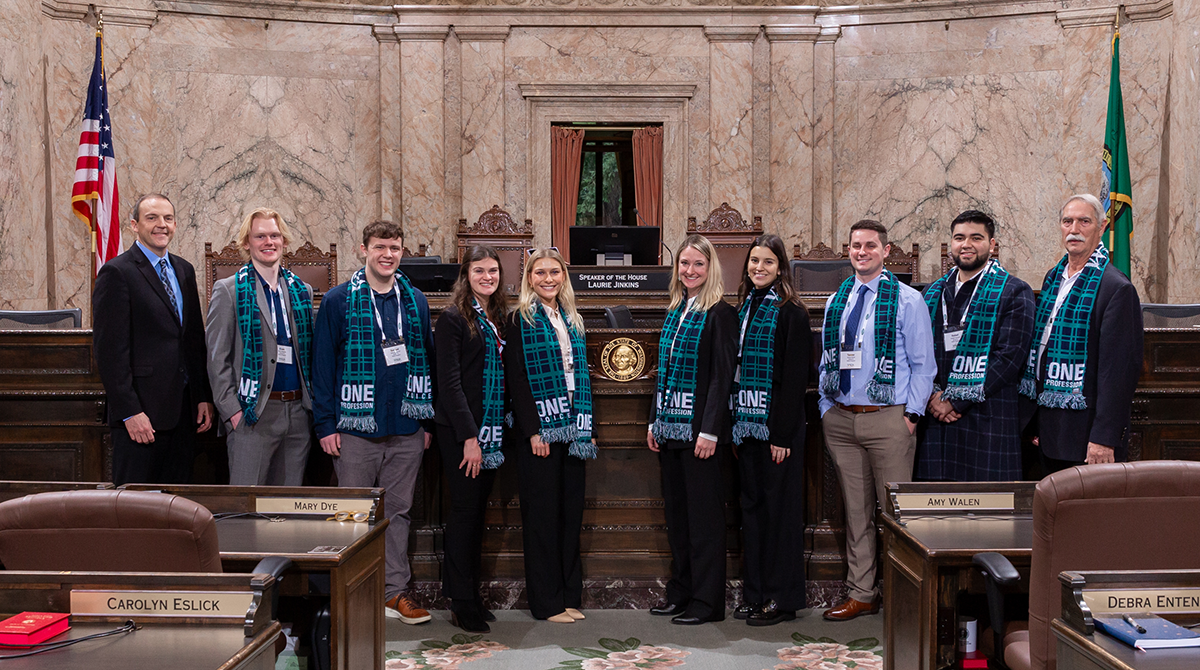Dear Friends and Neighbors,
The Legislative Session ends in just two weeks, and we’ve just hit another crucial deadline – Opposite House Policy Cutoff. This is the day when all the bills sent over from the Senate have to pass out of their House policy committees, and the same for House bills passing out of Senate policy committees.
Below, I have an update on my bills that were sent over to the Senate, as well as some great news about budget items funded for Spokane. I also recap our virtual town hall held on Tuesday night. I hope you enjoy this update and I look forward to sharing details about the final negotiated budgets and bills that are heading to the governor when session ends in a few weeks.
An update on health care bills: Expanding the workforce, protections of care, health care access and driving down costs
My efforts to expand access to affordable health care continue to make progress in the Legislature. Four of my bills have passed out of the Senate’s Health & Long Term Care Committee and are awaiting further action by the Senate by next week’s fiscal committee deadline.
Allowing physician assistants greater autonomy to provide patient care, while still ensuring safety, is a way we can expand access to health care in our rural and underserved communities. I prime sponsored HB 2041 to create collaboration agreements so that physician assistants can be supervised by and collaborate with physicians, but have a greater degree of autonomy. This will also free up physicians from spending time supervising when it is not needed. It’s a simple change, but one that half the states have already done, so it makes sense for us to pass my bill.
When the Affordable Care Act was passed, it established a number of preventive services that health insurers have to cover, which has been great for people’s health. In 2018, the Legislature took those provisions and put them into state law as well. We did that because some in Congress were trying to overturn the Affordable Care Act, which would have been a disaster. Luckily they failed, but these services are protected under state law no matter what happens in the future. Since then a number of new preventive services have been recommended to be covered, such as blood pressure screenings and colorectal cancer screenings. My bill, HB 1957, would expand the list of preventive services covered without cost sharing by the patient to include these new recommendations:
- immunizations for certain diseases, including diphtheria, hepatitis, influenza, and
- measles;
- certain screenings for children, including for lead exposure, oral health, vision, and
- autism;
- blood pressure and cholesterol screenings;
- screenings for certain diseases, including diabetes and HIV;
- certain screenings for pregnant women, including for gestational diabetes, maternal
- depression, and preeclampsia;
- pre-exposure prophylaxis HIV medication;
- certain cancer screenings, including breast, lung, and colorectal cancer screening; and
- contraception for women.
Having great health insurance options on our state marketplace is only helpful if you can put a manageable number of plans up against each other and have a direct comparison. Unfortunately, too many of the plans on the marketplace are non-standard and don’t offer the same benefits or have the same co-pays as other plans, but offer a lower price tag which can be appealing to families looking for coverage. But that low price tag can be deceiving when you end up paying more in co-pays, deductibles, and premiums. Having more of our plans be standardized will be simpler, allowing apples-to-apples comparisons for consumers, and will result in more predictable and lower costs to families. In fact, deductibles of standard plans average about $1,000 less than other plans. My bill, HB 2361, to increase the number of standardized plans is moving through the Senate and passed out of the Health & Long Term Care Committee this week.
Last year, I passed a bill that protects health care providers from disciplinary action when they perform a legal medical procedure, such as an abortion, that is allowed in Washington state. That might be common sense, but with so many states now seeking to ban or severely limit the ability to get reproductive care, many people were concerned that those states would try to bring disciplinary or even legal action against a health care provider if they performed an abortion on someone visiting from another state. My bill protects against disciplinary action and this year I introduced HB 1954, a trailer bill to further clarify the language to ensure that those providers are protected. This bill has already passed the Senate.

Budget proposals are out and what’s in them for Spokane
In the operating budget, I advocated for $500,000 for Launch NW. Imagine the impact of our community coming together to ensure children have opportunities and support to access their post-high school education or career of choice. This is the mission of Launch NW. The funding I secured will be used to match local spending for scholarships for students in Spokane, Garfield, and Columbia Counties. To be eligible for the scholarship students will have participated in wrap around supports provided for by LaunchNW through the “Mpower Mentoring Program.” Families will have to have filled out the FAFSA, or WASFA to be eligible for the scholarship. The scholarship will be used to fill the unmet tuition need for approximately 400 Washington students, with a maximum award of $5,000. The average award will be approximately $2,500. The scholarship can be used at the following at EWU, WSU, SFCC, CCS, GU and Whitworth.
Additionally, I am happy to report that the budget also included funding for the UW Regional Initiatives in Dental Education (RIDE) program to expand the number of students we can train in dentistry in our area. Other highlights included:
- $1 million for Crosswalk which is an emergency shelter for homeless youth and provides services and supports to help our youth exit homelessness and enter stable situations.
- $4 million for a grant to the city of Spokane to provide temporary emergency shelter for homeless individuals and for the cost associated with transitioning individual from their current shelter location.
We also introduced a supplemental House Capital Budget that includes some great project I worked to include and wanted to highlight:
- Latah Valley Fire Station ($350k)
- Seven Nations Healing Lodge expansion ($10 million)
- Underhill Park Sport Court Rehabilitation ($330k)
- SNAP Broadway Senior Housing ($1 million)
- Northwest Museum of Arts & Culture Parking Garage to make it safe for visitors ($1.477 million)
Town Hall Recap
Thank you to everyone who participated in our virtual town hall. You can go back and watch the town hall by clicking here.
We covered a variety of topics, including the discussion in the Legislature about housing reform, health insurance companies preauthorization processes, expanding access to health care, the cost of higher education and more.
It’s an honor to represent Spokane and serve the people of the 3rd Legislative District. Your participation is needed for a robust democracy and I appreciate answering all your questions. If you didn’t get a chance to join us for one of our two town halls this year, please reach out to my office.
It is my honor to serve you!
Sincerely,
Rep. Marcus Riccelli



